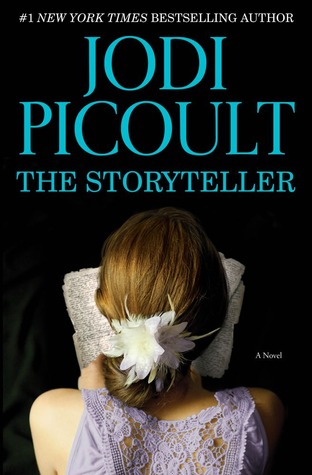(Original review posted on Goodreads : June 27, 2013)
The first few chapters of The Storyteller introduce us to Sage Singer - a twenty-something baker who is struggling with scars both emotional and physical. Following an accident that maimed half her face, Sage suffers from very low self-esteem, lives and works like a recluse and settles for being some guy's mistress.
Had I not read the blurb, I would have assumed that I was reading one of those chick-lit stories where an insecure girl with too much emotional baggage meets a guy who loves her for who she is.
400 pages later, that is EXACTLY what The Storyteller turned out to be.
What a bummer.
I'm not saying that The Storyteller doesn't talk about the Holocaust or doesn't do justice to it. In fact, the best parts are the flash-backs from WW2. I'll give credit where it's deserved - Jodi Picoult has researched the whole thing extremely well. And yet, the Holocaust angle always felt secondary to me. It did not get the attention it deserved. Or rather, undue attention was given to trivial plot-points.
Take the baking, for example. There is a ton of absolutely pointless information. What Sage bakes. Why she bakes. How she bakes. How gluten works. How brioche is made. Yadda yadda yadda.
Another useless detail that is hard to ignore - Sage's sisters are called Pepper and Saffron.
There's nothing technically wrong with those names except that they serve no purpose in the book whatsoever and stick out like a sore thumb.
All the side-characters were unrealistic and absolutely weird, again, for no reason other than grabbing undue attention. Who the hell speaks only in Haiku?? What kind of nun (or ex-nun) paints Jesus with the face of Bradley Cooper?? What is this, some Sophie Kinsella novel??
All that time Picoult wasted on meaningless digressions could have been better spent in developing Josef and Sage's friendship, which felt rather sudden and underwhelming to me.
There's another story about a vampire (No, I'm not joking.) that is narrated in parallel. It has allegorical meaning in the context of the book. I wish this story was kept separate, maybe like a prologue/epilogue to each part. It's jarring to go from SS officer in one chapter to blood-thirsty vampire in the next.
Now, the good part. Minka's harrowing tale of surviving the Holocaust is without question, the highlight of The Storyteller. The meticulously detailed descriptions make it nearly unbearable to read, but those 150 odd pages tell a supremely compelling story. For that one section, I'd say Brava, Ms Picoult.
Sadly, even Minka's story cannot save The Storyteller from my 2-star shelf. What should have been about Josef and Minka focused too much on Sage and Leo.
The first few chapters of The Storyteller introduce us to Sage Singer - a twenty-something baker who is struggling with scars both emotional and physical. Following an accident that maimed half her face, Sage suffers from very low self-esteem, lives and works like a recluse and settles for being some guy's mistress.
Had I not read the blurb, I would have assumed that I was reading one of those chick-lit stories where an insecure girl with too much emotional baggage meets a guy who loves her for who she is.
400 pages later, that is EXACTLY what The Storyteller turned out to be.
What a bummer.
I'm not saying that The Storyteller doesn't talk about the Holocaust or doesn't do justice to it. In fact, the best parts are the flash-backs from WW2. I'll give credit where it's deserved - Jodi Picoult has researched the whole thing extremely well. And yet, the Holocaust angle always felt secondary to me. It did not get the attention it deserved. Or rather, undue attention was given to trivial plot-points.
Take the baking, for example. There is a ton of absolutely pointless information. What Sage bakes. Why she bakes. How she bakes. How gluten works. How brioche is made. Yadda yadda yadda.
Another useless detail that is hard to ignore - Sage's sisters are called Pepper and Saffron.
There's nothing technically wrong with those names except that they serve no purpose in the book whatsoever and stick out like a sore thumb.
All the side-characters were unrealistic and absolutely weird, again, for no reason other than grabbing undue attention. Who the hell speaks only in Haiku?? What kind of nun (or ex-nun) paints Jesus with the face of Bradley Cooper?? What is this, some Sophie Kinsella novel??
All that time Picoult wasted on meaningless digressions could have been better spent in developing Josef and Sage's friendship, which felt rather sudden and underwhelming to me.
There's another story about a vampire (No, I'm not joking.) that is narrated in parallel. It has allegorical meaning in the context of the book. I wish this story was kept separate, maybe like a prologue/epilogue to each part. It's jarring to go from SS officer in one chapter to blood-thirsty vampire in the next.
Now, the good part. Minka's harrowing tale of surviving the Holocaust is without question, the highlight of The Storyteller. The meticulously detailed descriptions make it nearly unbearable to read, but those 150 odd pages tell a supremely compelling story. For that one section, I'd say Brava, Ms Picoult.
Sadly, even Minka's story cannot save The Storyteller from my 2-star shelf. What should have been about Josef and Minka focused too much on Sage and Leo.
2 out of 5 stars


No comments:
Post a Comment